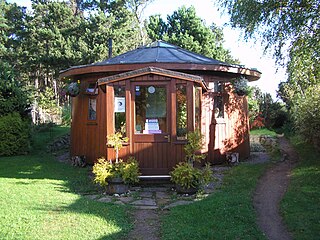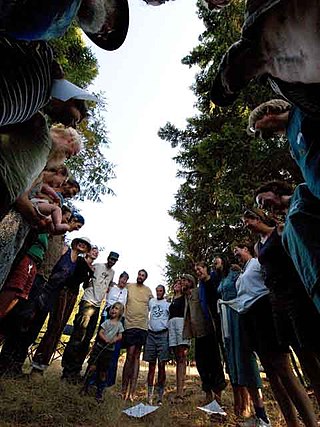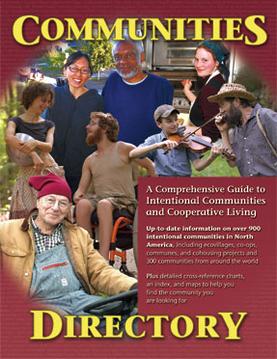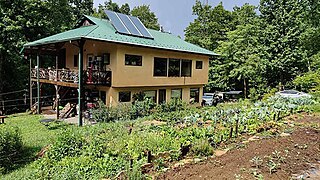Related Research Articles

An ecovillage is a traditional or intentional community with the goal of becoming more socially, culturally, economically, and/or ecologically sustainable. An ecovillage strives to produce the least possible negative impact on the natural environment through intentional physical design and resident behavior choices. It is consciously designed through locally owned, participatory processes to regenerate and restore its social and natural environments. Most range from a population of 50 to 250 individuals, although some are smaller, and traditional ecovillages are often much larger. Larger ecovillages often exist as networks of smaller sub-communities. Some ecovillages have grown through like-minded individuals, families, or other small groups—who are not members, at least at the outset—settling on the ecovillage's periphery and participating de facto in the community. There are currently more than 10,000 ecovillages around the world.

Rutledge is a village in Scotland County, Missouri, United States. As of the 2020 census, its population was 86.

An intentional community is a voluntary residential community which is designed to have a high degree of social cohesion and teamwork. The members of an intentional community typically hold a common social, political, religious, or spiritual vision, and typically share responsibilities and property. This way of life is sometimes characterized as an "alternative lifestyle". Intentional communities can be seen as social experiments or communal experiments. The multitude of intentional communities includes collective households, cohousing communities, coliving, ecovillages, monasteries, survivalist retreats, kibbutzim, hutterites, ashrams, and housing cooperatives.
May East ,PhD is a British/Brazilian urbanist, educator, singer and songwriter. Over the years she has alternated voices of advocacy with voices of inspiration and considered herself an artivist.

The Foundation for Intentional Community (FIC), formerly the Fellowship of Intentional Communities then the Fellowship for Intentional Community, provides publications, referrals, support services, and "sharing opportunities" for a wide range of intentional communities including: cohousing groups, community land trusts, communal societies, class-harmony communities, housing cooperatives, cofamilies, and ecovillages, along with community networks, support organizations, and people seeking a home in community. The FIC is a nonprofit 501(c)(3) organization in the United States.

The Craik Sustainable Living Project (CSLP) is a nonprofit organization for sustainable development that aims to advance the local use of more ecologically sound technologies and ways of living in rural Saskatchewan, Canada. The four key components of the project are the eco-centre, outreach and education programs, community action, and the ecovillage.
Communities: Life in Cooperative Culture is a quarterly magazine published by the Global Ecovillage Network - United States. It is a primary resource for information, issues, and ideas about intentional communities in North America. Articles and columns cover practical "how-to" issues of community living as well as personal stories about forming new communities, decision-making, conflict resolution, raising children in community, and sustainability.

Yarrow is a small community located 90 kilometres east of Vancouver within the City of Chilliwack in British Columbia, Canada. It is in the Fraser Valley at the foot of Vedder Mountain. The village was first settled by Mennonites in the late 1920s, following the draining of Sumas Lake and the reclamation of the former lake bed for agriculture.
Lost Valley Educational Center is an intentional community and ecovillage located on 87 acres (350,000 m2) acres of mostly forested land in Dexter, Oregon, United States, approximately 18 miles (29 km) southeast of Eugene. The center was founded in 1989 and is located on the grounds of the old headquarters of the Shiloh Youth Revival Centers.

Findhorn Ecovillage is an experimental architectural community project based at The Park, in Moray, Scotland, near the village of Findhorn. The project's main aim is to demonstrate a sustainable development in environmental, social, and economic terms. Work began in the early 1980s under the auspices of the Findhorn Foundation but now includes a wide diversity of organisations and activities. Numerous different ecological techniques are in use, and the project has won a variety of awards, including the UN-Habitat Best Practice Designation in 1998.

Diana Leafe Christian is an author, former editor of Communities magazine, and nationwide speaker and workshop presenter on starting new ecovillages, on sustainability, on building communities, and on governance by sociocracy. She lives in an off-grid homestead at Earthaven Ecovillage in the Blue Ridge Mountains of North Carolina, U.S. She has said that living in an intentional community "is the longest, most expensive, personal growth workshop you will ever take."

The Communities Directory, A Comprehensive Guide to Intentional Community provides listing of intentional communities primarily from North America but also from around the world. The Communities Directory has both an online and a print edition, which is published based on data from the website.

The Ecovillage at Currumbin is an innovative residential community at 639 Currumbin Creek Road, Currumbin Valley, Queensland, Australia. It showcases best practices in residential ecologically sustainable development. The ecovillage project has been developed on degraded farmland on the exurban fringe of City of Gold Coast, a major resort city on Queensland’s South East Queensland coast. The developer, Land Matters Currumbin Valley, has rehabilitated the site and is protecting its environmental integrity and biodiversity by preserving 50 percent of the site as an environmental reserve.
The Cloughjordan Ecovillage is an ongoing project to create an eco-village community with commitments to ecological, social and economic sustainability. This community is being developed on 67 acres (270,000 m2) of farmland within the townland of Oxpark purchased in 2005 and merges with the existing village of Cloughjordan, County Tipperary in Ireland. The first residents moved into their homes in the eco-village in December 2009.
Lammas Ecovillage is a low-impact, off-grid ecovillage in Glandwr, near Crymych in Pembrokeshire, West Wales, comprising nine households and a community hub on a 76 acres (31 ha) site. Buildings are constructed of natural materials and energy obtained from renewable sources. Planning permission took some years to obtain, but has established a replicable template for similar future developments in Wales.
Low-impact development (LID) has been defined as "development which through its low negative environmental impact either enhances or does not significantly diminish environmental quality".
Suderbyn Ecovillage is an experimental intentional community based on the island Gotland in Sweden, south of Visby. The project’s main purpose is to live a sustainable lifestyle as an ecovillage. Although preparations were done in 2006 and 2007, in July 2008 Suderbyn Ecovillage started officially and developed to Suderbyn Permaculture Ecovillage and NGO Relearn. Several ecological techniques such as permaculture are central and social projects as well as festivals have been organized on the property. For example, the No More War Festival was held from 17 to 20 August 2017. There is a big focus on sustainability and environmentalism. Suderbyn provides an educational model for environmentally-friendly accommodation, wastewater treatment, food and energy production. Their main language is English.

Earthaven is an ecovillage in Western North Carolina, about 50 minutes from Asheville.
Ecovillages in China are typically rural communities designed to promote ecological, cultural, economic, and social sustainability, in concert with the natural environment of a particular area. These are small human settlements with a community-based approach designed by the community themselves. Ecovillages are not completely isolated from other settlements, although they aspire to increased self-sufficiency.
References
- ↑ Ecological Covenants Dancing Rabbit
- ↑ "Dancing Rabbit Sustainability Guidelines". Dancing Rabbit Ecovillage.
- ↑ "Co-ops". Dancing Rabbit Ecovillage.
- ↑ "The Rhythm of Rutledge". Archived from the original on April 28, 2013.
- ↑ "Dancing Rabbit Eco Village". myworldtoo.com.
- ↑ "Dancing Rabbit Ecovillage". PBS.